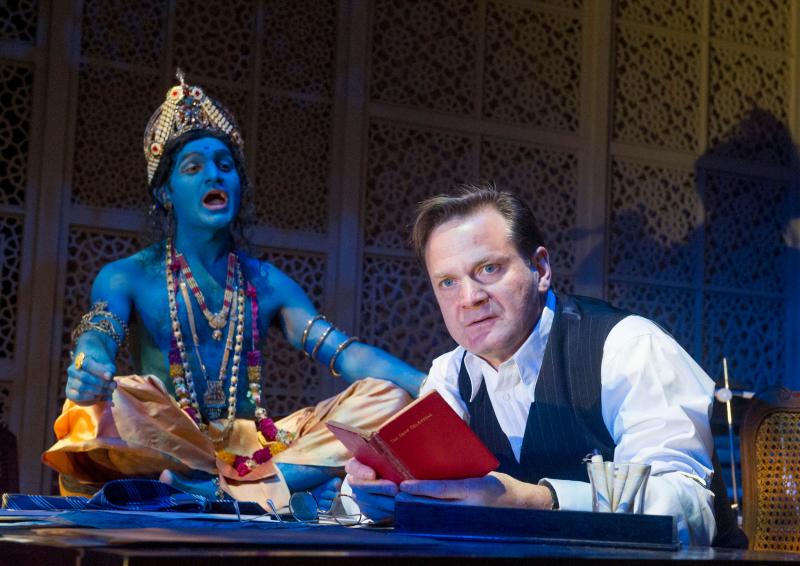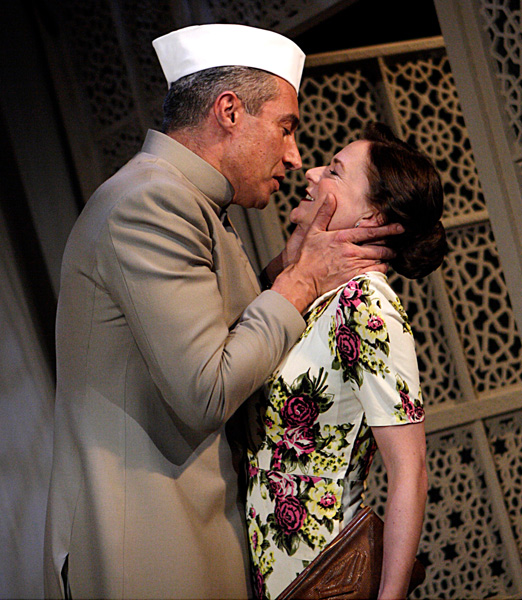Drawing the Line, Hampstead Theatre | reviews, news & interviews
Drawing the Line, Hampstead Theatre
Drawing the Line, Hampstead Theatre
Howard Brenton’s fascinating new play about the 1947 Partition of India is brilliantly staged

The Partition of India and Pakistan in 1947 is one of those epoch-making events that are so huge as to be almost beyond our comprehension. It affected the lives of literally millions of people. And has a resonance today. To understand this cataclysmic event, you feel, will require six hours of documentary, a two-month mini-series or a novel of at least 600 pages. Yet here is Howard Brenton’s new play, which opened last night, and it tells the story in one quick evening.
Brenton achieves this compression by focusing on a small tale at the heart of the larger epic. While the big names – Gandhi, Nehru, Jinnah, Atlee, the Mountbattens – do take the stage, the main focus of the story is on Cyril Radcliffe. Who? Well, exactly. Radcliffe was the man to whom British prime minister Atlee delegated the task of drawing the boundary line between the newly independent countries of India and Pakistan. Of course, you think, someone had to do it. But was he the right man for the job?
A very English play about a very English story
In 1947, when the story begins, Radcliffe is a judge in London. He’s a bit of a pen-pusher and has never been to India. He has no cartographic experience. And he has only five weeks in which to do this politically sensitive job. For while the saintly Gandhi objects to any partition, Nehru and Jinnah are manipulative politicians, each trying to get the best for their Hindu and Muslim constituencies. So Radcliffe stumbles into the lion’s den, and gets a bit of a mauling.
With great good humour and a fine eye for the historically telling detail, Brenton shows how Radcliffe starts off as the quintessentially confident Englishman – he has gone to the right schools, had the right jobs and belongs to the right clubs – and ends up suffering a crisis of confidence. And who can blame him? The task of cutting a country in half when the many different faiths live cheek by jowl in the same villages would defeat anyone.
 As the deadline approaches, Radcliffe falls ill, getting more and more feverish and desperate. He is plagued by doubt, by squabbling assistants and has very little time for, and less understanding of, the bigger picture. Or even of the local gossip. While Edwina, Lady Mountbatten is having a love affair with Nehru, Radcliffe remains ignorant of her influence, and knows practically nothing of all the other players. Yet on his decisions the fate of millions hangs.
As the deadline approaches, Radcliffe falls ill, getting more and more feverish and desperate. He is plagued by doubt, by squabbling assistants and has very little time for, and less understanding of, the bigger picture. Or even of the local gossip. While Edwina, Lady Mountbatten is having a love affair with Nehru, Radcliffe remains ignorant of her influence, and knows practically nothing of all the other players. Yet on his decisions the fate of millions hangs.
This is a very English play about a very English story. The idealism of the first scenes, with the protagonists convinced of the value of fair play and tolerance, while comparing a massive subcontinent such as India to a cricket field, is typical. As is the fact that all the main players have had a good English education. And although Brenton stresses the fact that fanaticism and spilt blood is stronger than reason and level heads, with the play ending on a amazing coup de théâtre, much of the proceedings are on the level of, as one of the characters puts it, a “Gilbert and Sullivan opera” – or should that read “farce”?
Certainly, director Howard Davies’s compelling production moves at a cracking pace – and revels in the theatricality of the material. Brenton’s play sketches out history in very broad brushstrokes. Tom Beard’s Radcliffe, at first clearly out of his depth, grows into a typically British unsung hero. Silas Carson, Lucy Black (pictured above) and Andrew Havill lend the Nehru-Mountbatten triangle an old world charm, while Paul Bazely makes Jinnah a thoughtful figure. Other members of a huge cast give the play its epic sweep. But the pleasure of the evening lies less in the performances than in the sheer eccentric craziness of the story.
rating
Buy
Share this article
The future of Arts Journalism
You can stop theartsdesk.com closing!
We urgently need financing to survive. Our fundraising drive has thus far raised £49,000 but we need to reach £100,000 or we will be forced to close. Please contribute here: https://gofund.me/c3f6033d
And if you can forward this information to anyone who might assist, we’d be grateful.

Subscribe to theartsdesk.com
Thank you for continuing to read our work on theartsdesk.com. For unlimited access to every article in its entirety, including our archive of more than 15,000 pieces, we're asking for £5 per month or £40 per year. We feel it's a very good deal, and hope you do too.
To take a subscription now simply click here.
And if you're looking for that extra gift for a friend or family member, why not treat them to a theartsdesk.com gift subscription?
more Theatre
 Top Hat, Chichester Festival Theatre review - top spectacle but book tails off
Glitz and glamour in revived dance show based on Fred and Ginger's movie
Top Hat, Chichester Festival Theatre review - top spectacle but book tails off
Glitz and glamour in revived dance show based on Fred and Ginger's movie
 Edinburgh Fringe 2025 reviews: Alright Sunshine / K Mak at the Planetarium / PAINKILLERS
Three early Fringe theatre shows offer blissed-out beats, identity questions and powerful drama
Edinburgh Fringe 2025 reviews: Alright Sunshine / K Mak at the Planetarium / PAINKILLERS
Three early Fringe theatre shows offer blissed-out beats, identity questions and powerful drama
 The Daughter of Time, Charing Cross Theatre review - unfocused version of novel that cleared Richard III
The writer did impressive research but shouldn't have fleshed out Josephine Tey’s story
The Daughter of Time, Charing Cross Theatre review - unfocused version of novel that cleared Richard III
The writer did impressive research but shouldn't have fleshed out Josephine Tey’s story
 Evita, London Palladium review - even more thrilling the second time round
Andrew Lloyd Webber's best musical gets a brave, biting makeover for the modern age
Evita, London Palladium review - even more thrilling the second time round
Andrew Lloyd Webber's best musical gets a brave, biting makeover for the modern age
 Maiden Voyage, Southwark Playhouse review - new musical runs aground
Pleasant tunes well sung and a good story, but not a good show
Maiden Voyage, Southwark Playhouse review - new musical runs aground
Pleasant tunes well sung and a good story, but not a good show
 The Winter's Tale, RSC, Stratford review - problem play proves problematic
Strong women have the last laugh, but the play's bizarre structure overwhelms everything
The Winter's Tale, RSC, Stratford review - problem play proves problematic
Strong women have the last laugh, but the play's bizarre structure overwhelms everything
 Brixton Calling, Southwark Playhouse review - life-affirming entertainment, both then and now
Nostalgic, but the message is bang up to date
Brixton Calling, Southwark Playhouse review - life-affirming entertainment, both then and now
Nostalgic, but the message is bang up to date
 Inter Alia, National Theatre review - dazzling performance, questionable writing
Suzie Miller’s follow up to her massive hit 'Prima Facie' stars Rosamund Pike
Inter Alia, National Theatre review - dazzling performance, questionable writing
Suzie Miller’s follow up to her massive hit 'Prima Facie' stars Rosamund Pike
 A Moon for the Misbegotten, Almeida Theatre review - Michael Shannon sears the night sky
Rebecca Frecknall shifts American gears to largely satisfying effect
A Moon for the Misbegotten, Almeida Theatre review - Michael Shannon sears the night sky
Rebecca Frecknall shifts American gears to largely satisfying effect
 Burlesque, Savoy Theatre review - exhaustingly vapid
Adaptation of 2010 film is busy, bustling - and bad
Burlesque, Savoy Theatre review - exhaustingly vapid
Adaptation of 2010 film is busy, bustling - and bad
 Don't Rock the Boat, The Mill at Sonning review - all aboard for some old-school comedy mishaps
Great fun, if more 20th century than 21st
Don't Rock the Boat, The Mill at Sonning review - all aboard for some old-school comedy mishaps
Great fun, if more 20th century than 21st
 The Estate, National Theatre review - hugely entertaining, but also unconvincing
Comedy debut stars Adeel Akhtar, but is an awkward mix of the personal and the political
The Estate, National Theatre review - hugely entertaining, but also unconvincing
Comedy debut stars Adeel Akhtar, but is an awkward mix of the personal and the political

Add comment